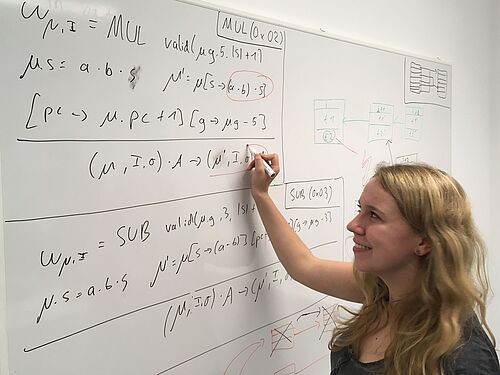Blockchain technology is like almost every other new invention: it brings new opportunities, but also bears some risks. CASA Principal Investigator Clara Schneidewind and the Heinz Nixdorf Research Group for Cryptocurrencies and Smart Contracts at the Max Planck Institute for Security and Privacy are taking a specific look at this. The Heinz Nixdorf Foundation has been funding the group since September 2021 with 1.15 million euros for the next five years.
The social benefit is an important incitement for Clara Schneidewind to dedicate herself to the blockchain and its applications. "In the beginning, I was mainly attracted by the mathematical challenge, but the social relevance has become more and more important as a motivation," says the computer scientist.
What does security mean in the blockchain?
With a blockchain, transactions can be processed transparently and decentralized. An account, for example, is no longer managed centrally by a bank, but distributed across many computers worldwide: they all store the necessary data so that everyone can see who owns what amount of a cryptocurrency. What has arisen from a certain distrust of established institutions, however, comes with new requirements for data security and data protection. New programs must be written for financial transactions and products, such as transfers, investments, and loans. In the process, mistakes can be made that lead to security gaps. "When it comes to cryptocurrencies, the security holes are particularly interesting for attackers because there is a lot of money to steal," says Clara Schneidewind. The computer scientist's team is not only concerned with detecting and closing specific points of attack in blockchain programs. The researchers are also asking fundamental questions, such as what security means for such programs in the first place. The special characteristics of the software, such as its decentralized mode of operation, mean that it must also meet different security requirements than conventional programs: It cannot be hermetically sealed off from outside access.
In addition to security and data protection, there are other open questions with blockchain technology: a blockchain is always stored on the computers of all users, and all computers must of course also follow all changes in complex computing operations. This requires storage space, computing time and a lot of energy. The blockchain therefore currently only manages seven transactions per second, while the credit card company Visa processes 10,000 transactions in the same time. Clara Schneidewind's group is therefore looking for ways to use the advantages of the Blockchain and mitigate the disadvantages.
The increasing importance of cryptocurrencies and blockchain technology for everyday processes are the motivation for Clara Schneidewind to dedicate herself to research: "I think it's important to explore what technology can do today - for better or for worse. Only then society can make an informed decision on how to use technology."
About the Foundation
The Heinz Nixdorf Foundation supports projects in education specially vocational training and further education in the field of modern technology, in science, especially in information technology, in health promotion and in sport. The foundation's purposes are primarily realized in cooperation with other non-profit organizations.
General note: In case of using gender-assigning attributes we include all those who consider themselves in this gender regardless of their own biological sex.
Cryptocurrency, But Secure

Copyright: Niklas Grimm

